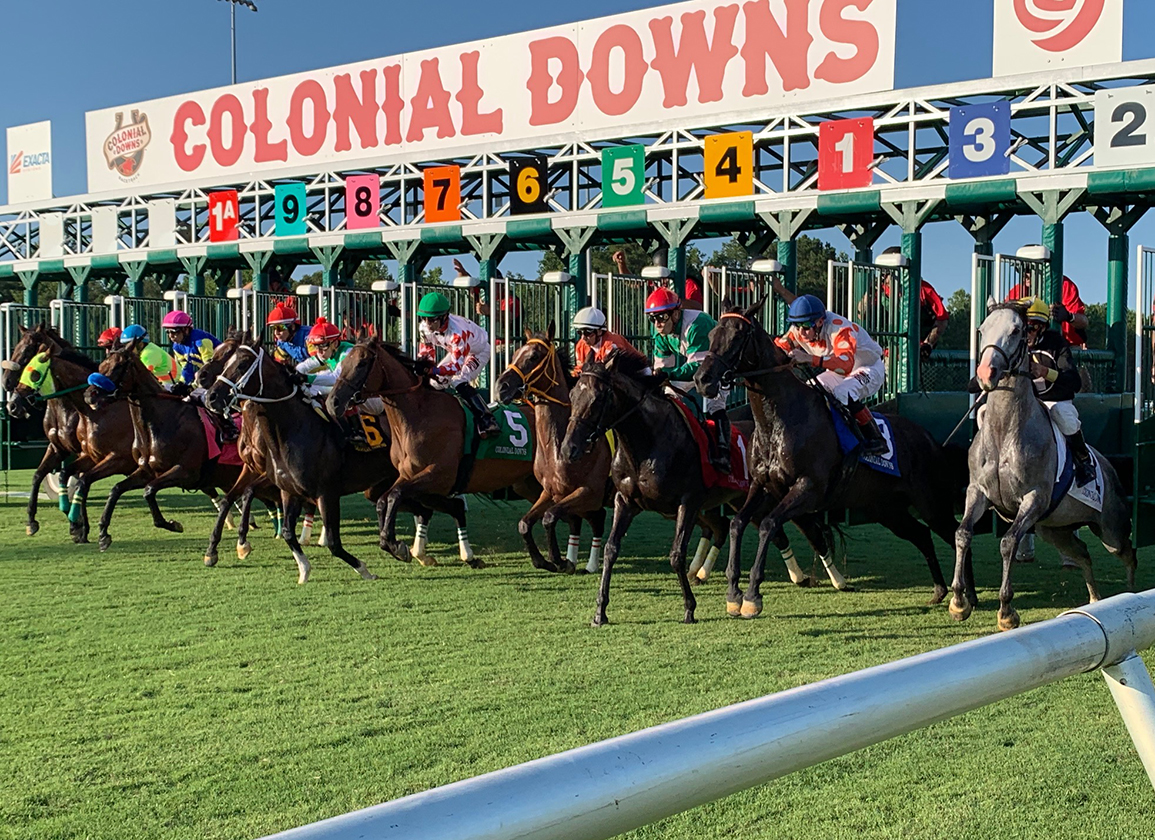By T. D. Thornton
By 2026, the gaming corporation that owns Colonial Downs is aiming to nearly double the amount of racing at the turf-centric Virginia track, potentially expanding the current boutique-styled summer race meet from 27 to 50 dates.
That news was revealed Thursday morning by Bill Carstanjen, the chief executive officer of Churchill Downs, Inc. (CDI), who briefly mentioned the dates increase during a public quarterly earnings conference call with investment bankers.
The reason has everything to do with CDI's gaming revenue and apparently very little do with the overall scope of the region's racing.
Almost as an aside during a larger discussion about CDI's in-progress acquisition of Colonial and its network of gaming businesses, Carstanjen said that CDI is “working on plans to enhance the racing” as the result of a corporate strategy to maximize the number of historical horse racing machines (HRMs) that it can operate at various locations in the state.
“Based on Virginia law, we will be required to run one race date for every 100 HRMs that are operational in the state, up to the 5,000 HRMs we are currently authorized,” Carstanjen said.
“Colonial Downs will hold 27 race dates this year in conjunction with the approximately 2,700 HRM machines now deployed. Over the next two to four years we expect to grow to up to 50 race dates as we reach 5,000 HRMs,” Carstanjen said.
An expansion of the racing schedule by that magnitude would almost certainly create horse availability strains in a region of the country that is geographically thick with competing tracks, but has a strong recent history of cooperation so as not to cannibalize the overall mid-Atlantic Thoroughbred product.
Frank Petramalo Jr., the executive director of the Virginia Horsemen's Benevolent and Protective Association, told TDN in a phone interview that he hadn't heard Carstanjen's comments, but he knew that the Virginia law allows for that level of race dates expansion.
Even though owners and trainers generally welcome the prospect of increased race dates, Petramalo urged restraint for the sake of the overall circuit.
“What I've said to both Bill Carstanjen and to [CDI president] Bill Mudd, our goal has always been to have a rational program within mid-Atlantic racing,” Petramalo said. “We were thinking that something smaller than [50 dates at Colonial] would fit in the mid-Atlantic. I certainly could change my mind, but I told both Bills that it's important to continue a cooperative relationship between Virginia and Maryland and Delaware [and] certainly Pennsylvania.”
Petramalo continued: “We have a lot of racing [in the region] and a diminishing number of horses. We think the way to success is to try to rationalize racing programs. Now I know that's an anathema to just about every state, but you can't keep running over other race meets. It just doesn't make any sense.”
After being closed for six years, Colonial reopened under new management in 2019, ushering in the HRM-fueled purse era in Virginia and carving out a reputation as an independent “comeback” track.
Petramalo said that earlier in Colonial's history, it had a contract with Maryland tracks that called for Maryland racing to shut down in June and July while Colonial ran unopposed. In turn, Colonial did not seek to expand its schedule beyond that agreed-upon time frame.
“Even after Colonial bought out that contract, we still had a cooperative relationship. We weren't running against each other,” Petramalo explained.
“Sure, we'd like to race 50 days,” Petramalo continued. “But it has to make economic sense to do that. Right now we don't really compete with Maryland because we race Monday, Tuesday, Wednesday, and they race weekends. We still have a lot of people going back and forth, and we both prosper that way.”
CDI owns four other Thoroughbred tracks nationwide–Churchill Downs, Turfway Park, Fair Grounds and Presque Isle Downs–and is in the process of receiving regulatory approvals so it can close the $2.4-billion Colonial sale. But beyond its presence at Presque Isle, the gaming corporation is a new player to the traditionally cooperative mid-Atlantic racing region.
Recent history begs the question of whether CDI can play nicely with its neighbors and horsemen.
Under CDI's stewardship this century, the gaming corporation has purchased and then closed down three major racetracks: Hollywood Park, Calder Race Course and Arlington International Racecourse. Its shutdown of Arlington last year capped a decade-long series of acrimonious relations with horsemen, and CDI is still being litigated in federal court over a $775,000 purse account dispute.
“We continue to analyze where to deploy additional HRMs in Virginia,” Carstanjen said during the July 28 call. “We are prioritizing locations based on population, disposable income, and likelihood of being able to pass a local referendum allowing for HRMs in the specified locations. We will provide updates on future earnings calls.”
Not a subscriber? Click here to sign up for the daily PDF or alerts.






